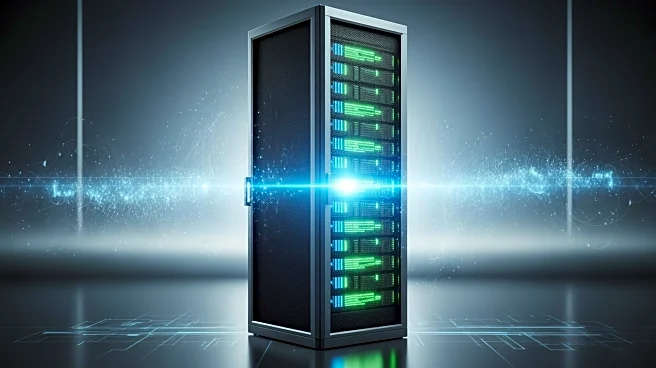What's Happening?
Technology companies are increasingly interested in establishing data centers in Michigan, which are essential for powering artificial intelligence, streaming services, and other digital activities. Major
utilities in the state, DTE Energy and Consumers Energy, have reported significant interest from tech firms in building these energy-intensive facilities. The expansion of data centers is expected to dramatically increase electricity demand, prompting utilities to consider expanding their energy production capabilities. However, environmental groups and some residents are concerned that this growth could lead to higher electricity bills and hinder the state's transition to renewable energy sources. The Michigan Public Service Commission is currently reviewing a proposal from Consumers Energy to implement specific tariffs for data centers, which would require them to operate for a minimum of 15 years and pay fees for early contract termination.
Why It's Important?
The development of data centers in Michigan has the potential to significantly impact the state's economy and energy infrastructure. While these facilities can create high-paying jobs and position Michigan as a digital infrastructure hub, they also pose challenges. The increased demand for electricity could lead to higher costs for consumers and complicate efforts to shift towards cleaner energy sources. The proposal by Consumers Energy aims to mitigate risks by ensuring data centers contribute to the costs of energy infrastructure development. However, environmental groups argue that the proposal does not sufficiently protect ratepayers or support the state's clean energy goals. The outcome of this regulatory review could set a precedent for how data centers are managed in Michigan and influence similar developments in other states.
What's Next?
The Michigan Public Service Commission's decision on Consumers Energy's proposal will be crucial in determining the future of data center development in the state. If approved, the tariffs could establish a framework for managing the economic and environmental impacts of these facilities. Stakeholders, including environmental groups, consumer advocates, and the data center industry, are actively involved in the discussions, each pushing for terms that align with their interests. The decision could influence other utilities and states considering similar expansions, potentially shaping national policies on data center operations and energy consumption.
Beyond the Headlines
The expansion of data centers in Michigan highlights broader issues related to energy consumption and environmental sustainability. As these facilities require substantial amounts of electricity and water for cooling, they raise concerns about resource depletion and environmental impact. The debate over tariffs and regulations reflects the ongoing tension between economic growth and environmental stewardship. Long-term, the development of data centers could drive innovation in energy efficiency and renewable energy integration, prompting utilities and tech companies to explore sustainable solutions.










